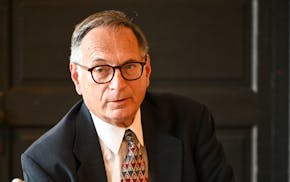Instead of shopping for deals, 500 people descended on Wal-Mart and McDonald's in St. Paul's Midway shopping district on Black Friday to demand higher wages and sick leave for all employees.
Closely guarded by police on foot, bikes and in squad cars, protest leaders yelled into bullhorns "What do we want? Justice! When do we want it? Now!"
Participants waved large signs that said, "I stand with Wal-Mart strikers," and "Pay your associates a living wage."
The march, which began at 10 a.m., was pulled together by Minnesotans for a Fair Economy and included 100 fast-food, health care and janitorial workers from Centro de Trabajadores Unidos en Lucha (CTUL).
Also present were members of Take Action Minnesota, the Teamsters union, the St. Paul Federation of Teachers and current or past employees of Wal-Mart and McDonald's. CTUL janitors joined the 10 a.m. protest at Wal-Mart in St. Paul after leaving an earlier protest at Home Depot at the Quarry in Minneapolis.
Friday's Wal-Mart actions were among 1,600 scheduled at stores across the country, though Wal-Mart spokeswoman Kayla Whaling said the company expected protests to reach only 200 to 300 stores nationwide.
Over the past three years, she said, "many of these scheduled protests never materialize." Whaling also noted that the majority of "protesters are from paid union groups and not our Wal-Mart associates. These large gatherings often involve hundreds of paid union people and maybe one or two of our associates."
Holding a large protest sign above his head outside Wal-Mart, Mike Schrader, from the United Church of Christ, said he was marching to send Wal-Mart and McDonald's a message. "These workers need a living wage. Not welfare," he said.
His friend, retired United Christ minister Bill Albertson, agreed. "These workers are hardly surviving on what they are making. And yet look at what the CEO is making."
Alisha Williams said she knows first hand what Wal-Mart's work policies do to employees' families. "I am a former Wal-Mart employee. But now I am an organizer," said Williams, who brought others to protest Friday from the Greater Minnesota Workers Center in St. Cloud. "I was a cashier at Wal-Mart in St. Cloud for a year making $7.65 an hour. It was very difficult being their employee. I didn't feel like I had a voice."
She has an asthmatic son but found it hard to get time off. "You couldn't ask for time off because the work schedule was set a month in advance," Williams said. "If you couldn't come in, you risked your job. And the wages were not enough. It was hard. I could not afford to buy my baby diapers."
Whaling at Wal-Mart said the average Wal-Mart associate makes $11.83 an hour and that full-time workers can earn up to six sick days a year depending on their length of service.
Steve Philion, chairman of the workers center in St. Cloud, said Wal-Mart's averages are still not enough. "Workers deserve a fair wage. So I support the fight for $15 an hour."
Guillermo Lindsay, the night manager at McDonald's Uptown restaurant in Minneapolis, said he was recently forced to come to work with the stomach flu because managers didn't answer their phones when he called four times to alert them that he was ill. "If I didn't come in, I would have gotten written up, suspended or fired. Instead I came in and then two other workers got sick."
Now Lindsay, Williams and hundreds of others are demanding legislation that provides sick leave for workers.
While Friday's crowd was quickly moved along by police, shoppers inside the packed Wal-Mart store paid little notice. Tom Flynn showed up at the store to look for a cellphone for his mother. "There was a strike? A protest?" he said as he exited the store just as the protesters passed. "Inside, it's calm. There are a couple of police officers in there. But I think they were there to prevent any shoplifting."
Dee DePass • 612-673-7725

GOP endorses Tad Jude for congressional seat Dean Phillips is leaving
One day in the frantic life of a Children's Minnesota emergency room nurse
Sen. Nicole Mitchell off committee assignments while case under review
